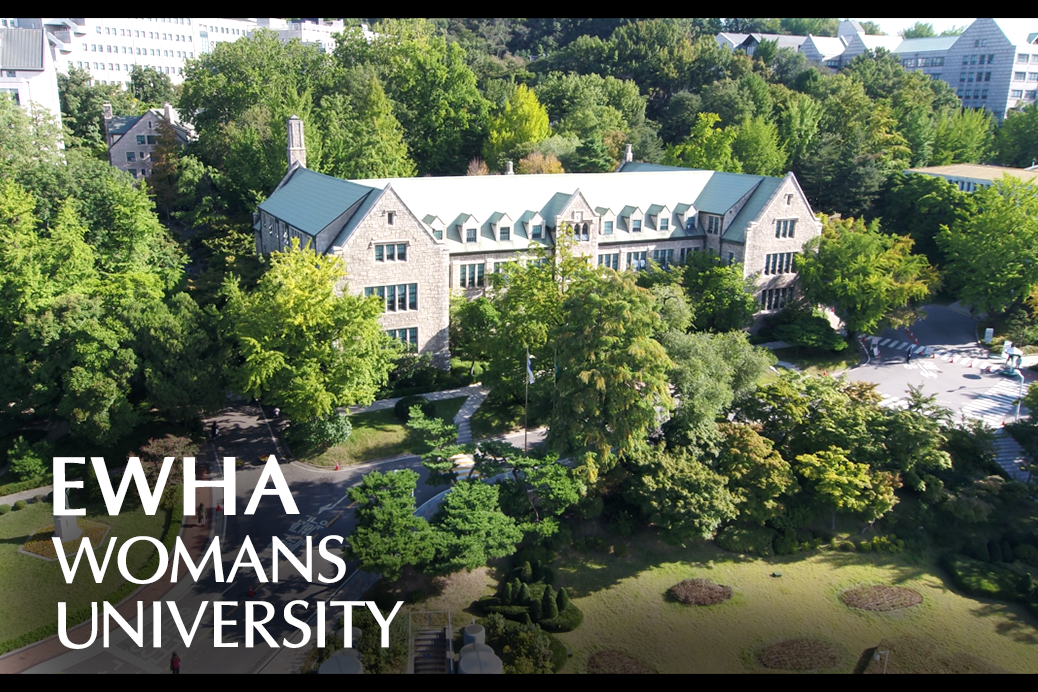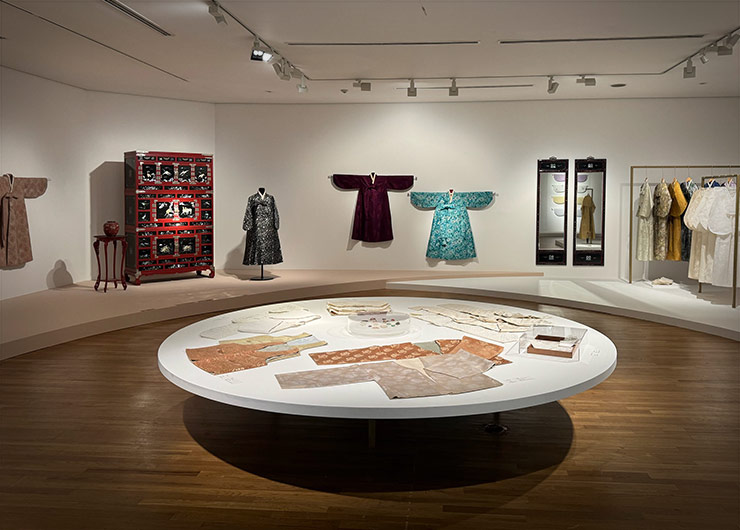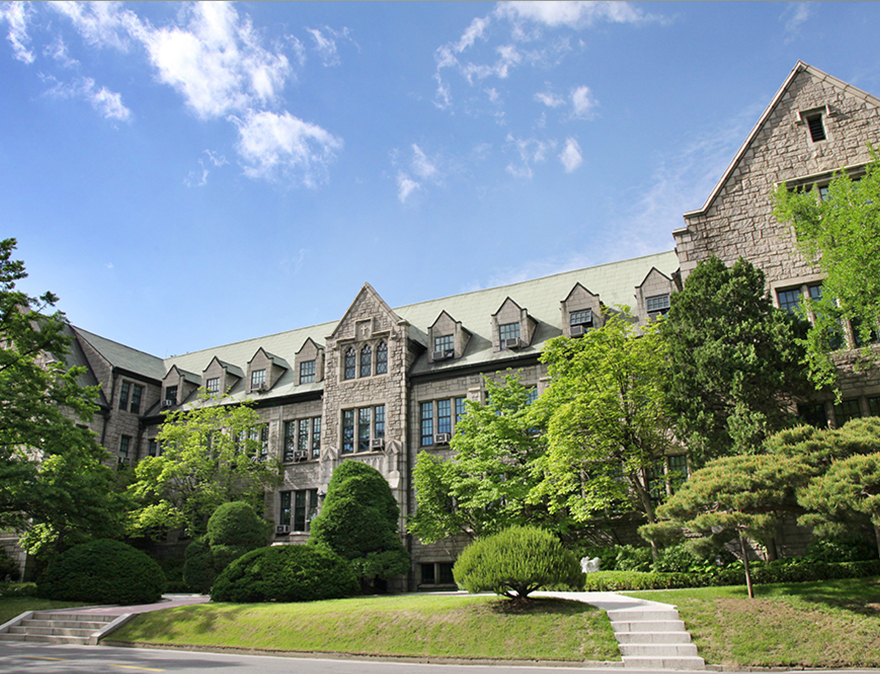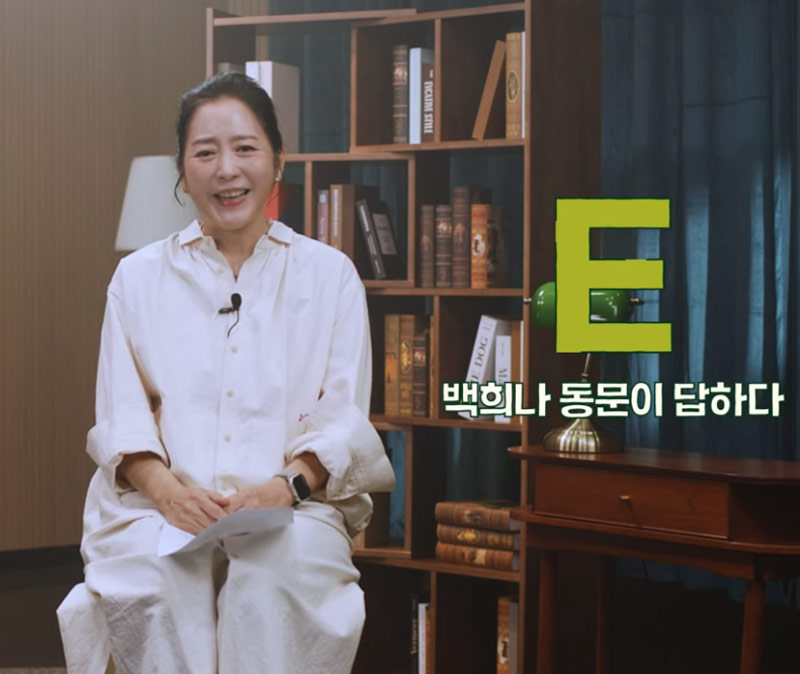News Center
EWHA NEWS
Special Exhibition Titled “Clothes: Wearing Time” Held in Commemoration of the 90h Anniversary of the Ewha Womans Univ.
Special Exhibition Titled “Clothes: Wearing Time” Held in Commemoration of the 90h Anniversary of the Ewha Womans University Museum On May 28, 2025 (Wed.), the Ewha Womans University Museum opened a special exhibition titled “Clothes: Wearing Time” to commemorate the 139th anniversary of Ewha’s founding and the 90th anniversary of the museum’s establishment. The opening ceremony held in the museum lobby was attended by about 150 distinguished guests from within and outside Ewha who gathered to celebrate the museum’s 90th anniversary, including Chairperson Chang Myong-Sue of the Ewha Womans University Board of Trustees and President Hyang-Sook Lee, Following the ceremony, visitors admired the special exhibition with a guided tour led by curatorial researcher Sujin SONG. Through this exhibition, the museum presents over 200 diverse clothing artifacts, from excavated artifacts of early Joseon-period garments to modern hanbok. The exhibition aims to explore clothing as an indispensable part of our lives and a cultural language that reflects both the personal narratives of individuals and the ever-changing tides of the times, allowing visitors to profoundly appreciate the meaning and beauty of clothing from different eras. Galleries 1 and 2, under the theme “Garments Made of Silk,” showcase a wide array of silk garments worn by the royal court and noble households, including “inner robe for official’s ceremonial attire,” believed to have been worn by Heungseon Daewongun (1820-1898) as court attire, as well as the ceremonial robe of wonsam and the over-apron, believed to have been gifted by Queen Sinjeong (1808–1890) to her natal family. Gallery 3 is dedicated to “Garments Made of Hemp and Cotton,” while Gallery 4 explores the theme “Transformation and New Aesthetics of Hanbok.” In Gallery 5, visitors can explore depictions of generations who wore hanbok in daily life through films and materials from the 1940s to the 1960s. In addition, an AI-based costume experience program allows visitors to create and keep illustrated images of themselves dressed in traditional clothing against the backdrop of the Ewha campus. This exhibition, arranged with partial support from the “University Museum Promotion Support Project,” hosted by the Ministry of Culture, Sports and Tourism and organized by the Korean Association of University Museums, will run through November 28, 2025 (Fri.). On the last Wednesday of each month, designated as Culture Day, the museum will extend its opening hours until 7 p.m. For further details, please visit the museum website (http://museum.ewha.ac.kr/).
Commemorative Ceremony Held for Ewha’s 139th Anniversary
Ewha held its 139th Anniversary Commemoration Ceremony at Welch-Ryang Auditorium on May 30, 2025 (Fri.). The event was attended by about 2,000 guests, including distinguished figures from within and outside Ewha such as Chairperson Chang Myong-Sue of the Ewha Womans University Board of Trustees, President Hyang-Sook Lee, President Lee Myung Kyung of the Ewha Alumnae Association, former Ewha presidents, former and incumbent alumnae lawmakers, and long-serving faculty and staff, as well as current students, to celebrate the 139th anniversary of Ewha’s founding. In her commemorative speech, President Hyang-Sook Lee emphasized Ewha’s mission by stating, “Amid the sweeping changes driven by innovations in cutting-edge technologies, including artificial intelligence (AI), Ewha must move beyond merely adapting to the social environment and instead fulfill its role as a creative intellectual community that envisions the future with clear insight and creates new value.” She further explained that the new slogan, “EWHA THE WORLD EWHA THE FUTURE,” serves as a declaration of Ewha’s commitment to proactively uphold its identity as a symbol of change and innovation, while gaining an understanding of the global environment and the times, fostering self-innovation, and paving the way into the future. She concluded by pledging, “I will drive Ewha’s greater leap forward based on education and research that shape the times, as well as sustainable innovation.” Next, Vice President for Research and External Affairs Jhungsoo Park unveiled the “New Era, New Ewha Development Plan,” established under the vision of “Ewha Leading the Era of Great Transformation through Inclusive Innovation.” Following the announcement of the development plan, an award ceremony was held to honor long-serving faculty and staff, and to present the Pride of Ewha Awards and the Ewha Academic Award. The 23rd Pride of Ewha Awards were presented to Young-hee Lee (Sociology, graduating class of 1962), Korea’s leading gayageum master, and Duk-hee Lee (Sociology, graduating class of 1963), President of the Korean Immigration Research Institute in Hawaii. The Pride of Ewha Award is granted to alumnae who have made outstanding contributions in various fields of society to exemplify the spirit of Ewha. Subsequently, the 21st Ewha Academic Award was conferred on Professor Hyun-Hea Yang of the Department of Christian Studies and Professor Joong-Ki Park of the Division of EcoScience. The Ewha Academic Award is a lifetime award given to faculty members for their contributions to the development of academia and the school through outstanding research achievements. After the ceremony, a luncheon was hosted by President Hyang-Sook Lee at Lee Sam-bong Hall and Conference Hall of the ECC building for distinguished guests and Ewha donors who attended the event. At the luncheon, President Lee presented plaques of appreciation to donors to the school’s development funds. In the afternoon at 2 p.m., the Alumnae Day event, organized by the Ewha Alumnae Association, was held at Welch-Ryang Auditorium. The Alumnae Day event was followed by the presentation of the tenth Light of Ewha Awards, a reunion of alumnae celebrating their 50th and 30th anniversaries of graduation, the selection of Ewha Forever Family and Ewha Family of the Year, and a choir festival.
-
Ewha in Media

- Cubig, a security synthetic data solution startup, was selected as the final winner 07.07
- Kang Sun-woo: Welfare expert lawmaker tapped as gender minister 06.24
- Philips Korea, EUMC and EUMC Aorta and Vascular Hospital sign MOU to establish ‘Center of Excellence’ for Aortic and Vas 06.24
Social Network Service
EWHA SNS
-
Facebook
Instagram
Youtube
![[오늘자 이화캠] 초록빛 한가득, 이화의 여름 [Today’s Ewhacam] Green everywhere, Ewha’s Summer #초록빛이화 #눈안에초록색한가득 #푸르른_이화캠퍼스 #석류나무 #무더위 #찐여름시작 #여름캠퍼스 #이화여자대학교 #이화여대 #이대 #EWHA #UNIV 이미지](https://scontent-ssn1-1.xx.fbcdn.net/v/t39.30808-6/518270264_1147115750783522_6611543573685562079_n.jpg?_nc_cat=104&ccb=1-7&_nc_sid=127cfc&_nc_ohc=w3z700V1ckUQ7kNvwFoYRIF&_nc_oc=AdkV9mQgP0fXwFdpxVktL95EVm3iD4mRRJObIpYAB6HkVxqq4E7gyp_DM3jP7MmNwKk&_nc_zt=23&_nc_ht=scontent-ssn1-1.xx&edm=AKIiGfEEAAAA&_nc_gid=oT8czjoFFF-rlrEwkH42KA&oh=00_AfTwx73QI4S-3naVG7YAHbTBp5AOJfDNr8Cq8E6pT46yMA&oe=68763407) 이화여자대학교 Ewha Womans University 2025-07-10
이화여자대학교 Ewha Womans University 2025-07-10[오늘자 이화캠] 초록빛 한가득, 이화의 여름 [Today’s Ewhacam] Green everywhere, Ewha’s Summer #초록빛이화 #눈안에초록색한가득 #푸르른_이화캠퍼스 #석류나무 #무더위 #찐여름시작 #여름캠퍼스 #이화여자대학교 #이화여대 #이대 #EWHA #UNIV
READ MORE ewha.w.univ 2025-07-10
ewha.w.univ 2025-07-10나만의 스페셜한 이.화.템. 맞추기 #이화굿즈 #나만의_이화템 #이화그린 #이화곰돌이다모여라 #이화갤럭시버즈백팩 #이화상점 #마크시리즈 #이화여자대학교 #이화여대 #이대 #EWHA #UNIV
READ MORE Ewha Womans University 2020-01-09
Ewha Womans University 2020-01-09Ewha paves a new road with each new endeavor. As Korea’s first modern school for women, Ewha showed that domains that were once deemed impossible for women were possible. And with each new endeavor, Ewha creates a new chapter in history. Ewha’s over 130 year-old history of leading changes of the future will continue.
READ MORE
Banners
EWHA Banner
























